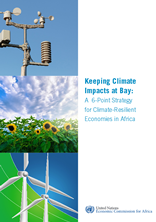Keeping Climate Impacts at Bay: a 6-point strategy for Climate-Resilient Economies in Africa

Keeping Climate Impacts at Bay: A 6-Point Strategy for Climate- Resilient Economies in Africa is a product that has arisen from a speech that I delivered during the Third Climate Change and Development in Africa Conference (CCDA III) on October 21st 2013 in Addis Ababa.
In this speech, I expressed my vision for Africa and articulated the continent’s climate needs via a 6-point climate strategy which have the potential to enable African institutions to renew their engagement with climate change impacts and craft effective policies that will help to facilitate climate resilient societies and economies.
I laid out a practical plan that will enable African countries to harness their huge potential in renewable energy resources (solar, wind, hydropower, geothermal and biomass) and expressed a clear vision for Africa as it seizes the momentum and leaps closer to new innovations, in the process breaking through entrenched energy barriers, through technology leapfrogging. I pointed to the need for structural transformation and for Africa to march towards industrialization and inclusive growth. I focused on agriculture as the principal foundation for Africa’s growth, and warned that there can be no structural transformation if the agricultural sector does not act as the hub and a conduit that will give sway to Africa’s thirst for a performing, productive, resilient, entrepreneurial and climate smart agricultural sector.
My vision of a climate resilient development pathway is one that recognizes the centrality of science as the lubricant that will bring societies together, and one in which human security becomes a central element of our collective quest. In recognizing the multifaceted challenges of developing economies and transforming lives in a changing climate, and by adopting a positive and proactive approach to climate change, I believe that solutions lie within our generation to keep climate change impacts in check and to translate these into business opportunities. In doing so, I strongly believe that the ability to take measures leading towards environmental sustainability is within our hands. They shape our trajectory; they are oblivious to boundaries, they start with the way we care for our oceans, the way we manage our tourism industries; our efforts to conserve and harvest water, and above all, an avid and intrinsic need to learn from each other through a culture of co-operation in generating and sharing knowledge. Climate change can change us – but it is our duty to catalyze a set of positive cascading changes in critical development sectors that will spell shared prosperity for our people and a hopeful and prosperous future for generations to come.
Carlos Lopes
United Nations Under Secretary General and
Executive Secretary of the Economic Commission for Africa